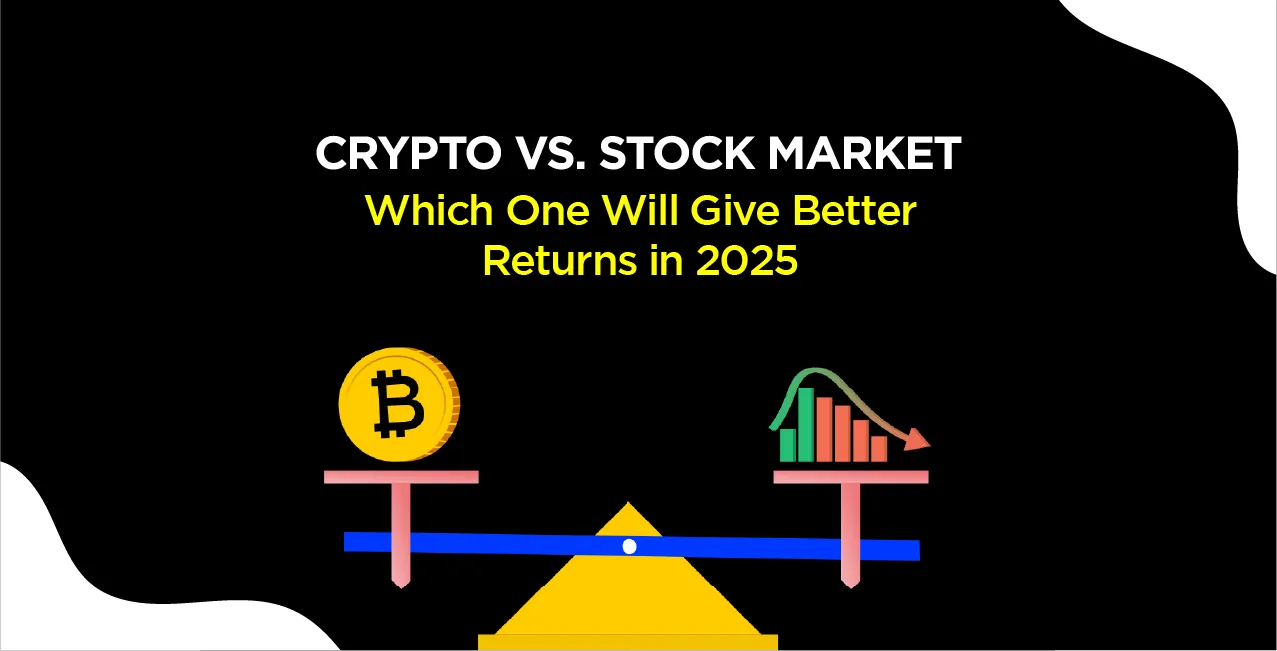Crypto vs. Stock Market: Which One Will Give Better Returns in 2025?

Check Your Loan Eligibility Now
By continuing, you agree to LoansJagat's Credit Report Terms of Use, Terms and Conditions, Privacy Policy, and authorize contact via Call, SMS, Email, or WhatsApp
Everyone, from teenagers to grown adults like you, knows the importance of investing. It is a smart habit that helps secure your future.
But you might ask, ‘Invest Kidhar Karein?’
With many options available, we want ventures that align with our goals and give us the best possible returns.
Dheeraj, a 28-year-old technician, is confused about whether to invest in traditional markets or cryptocurrency. Both options have their perks and risks. While conventional markets offer relatively stable returns, cryptocurrency is highly unpredictable.
You must be aware that over the last decade, bitcoin and other digital assets have outperformed stocks regarding raw percentage gains.
But do you know about its crashes? Investing in such unpredictable assets can wipe out all your savings. Meanwhile, stocks and index funds have provided steady, long-term returns with significantly lower risk.
For example, imagine it is 2017. You and your friend, Ranjana, invested ₹1 lakh each. You put your money into Bitcoin, while Rashmi opts for stocks.
In 2025, your investment is worth around ₹20-25 lakh, whereas Rashmi’s stock portfolio has grown to ₹2-3 lakh. You have better returns, but you also cannot ignore frequent market crashes that happened during the period.
Let’s understand each venture's risk factors with the table's help
Factor | Crypto (₹1L in 2017) | Stocks (₹1L in 2017) |
Value in 2025 | ₹20-25 lakh | ₹2-3 lakh |
Growth Pattern | Extreme ups and downs | Slow and steady |
Major Crashes | -80% (2018), -60% (2022) | Minor corrections, no extreme loss |
Liquidity | High but market-driven | High and stable |
Regulatory Risks | High, uncertain laws | Low, well-regulated |
Psychological Impact | Stressful, unpredictable | Low-stress, stable returns |
Risk Level | Very high | Low |
Ideal for | High-risk takers | Conservative investors |
According to a recent analysis, Bitcoin’s annualised return has stood at 230% since 2011. (Coin Glass) It is a lot higher than the S&P 500’s 10.7% over the same period. (Investopedia) However, as you know, the crypto market remains highly unpredictable; with regulatory concerns and economic shifts, the risks have increased tenfold!
Read More - Is Investing in Bitcoin Still Worth It in 2025
Before investing in either Bitcoin or traditional markets, it’s essential to take a comprehensive, 360-degree perspective to understand each venture's opportunities and challenges.
What Are Cryptocurrency and Stocks?
Have you ever wondered how a monetary system would work without being controlled by banks or governments?
Cryptocurrencies are one such example. These currencies are digital, which means they do not have any physical presence. Additionally, they are regulated by blockchain technology.
This technology is a super-secure and decentralised system that records transactions. Moreover, crypto operates in a peer-to-peer network, which means no middleman controls or regulates it.
Types of Cryptocurrencies
Let’s look into some established and speculative cryptocurrencies and understand their differences with the help of a table.
Cryptocurrency | Category | Risk Level | Key Characteristics |
Bitcoin (BTC) | Blue-chip Crypto | Medium | Oldest, most trusted, limited supply (21M coins), considered "digital gold" |
Ethereum (ETH) | Blue-chip Crypto | Medium | Smart contracts, the foundation for DeFi & NFTs, widely adopted |
Solana (SOL) | High-Risk Crypto | High | Fast transactions, lower fees than Ethereum, still evolving |
Dogecoin (DOGE) | Meme Coin | Very High | It started as a joke, was highly speculative, and was influenced by social media |
On the other hand, when you invest in stocks, you are buying a tiny piece of a company. If the company performs well, your stock value increases. But if the market crashes, so will your investments. ‘Risk har jagah hai’. Furthermore, you may also get a chance to earn dividends (a portion of company profits paid to shareholders).
Stock markets, such as the NSE (National Stock Exchange), are regulated bodies monitored by regulatory bodies like SEBI (Securities and Exchange Board of India) to prevent fraud and ensure fairness. Stock markets are also places where companies list their shares.
Unlike cryptocurrencies, stock markets operate within fixed trading hours, allowing investors to plan their trades without being constantly alert.
Several factors make one venture better than the other. With the help of the table, let’s understand each factor and learn the differences between cryptocurrency and the stock market.
Factor | Cryptocurrency | Stocks |
Ownership | Digital assets are stored in a crypto wallet. | Ownership in a company |
Market Regulation | Mostly unregulated | Highly regulated by financial authorities (e.g., SEBI in India). |
Trading Hours | 24/7 market, no restrictions. | Limited trading hours depend on stock exchanges (e.g., NSE operates from 9:15 AM to 3:30 PM IST). |
Price Fluctuation | Extremely high | Moderate |
Returns | Massive short-term gains | Steady, long-term growth |
Risk Level | Very high; prone to crashes, hacks, and scams. | Moderate |
Security Risks | High (if you lose your private keys, funds are unrecoverable). | Low |
Investment Type | Speculative, high-risk, high-reward. | Long-term, wealth-building, relatively safer. |
Influencing Factors | Influenced by market hype, social media, regulations, and adoption trends. | Influenced by company performance, economy, interest rates, and global events. |
Dividends & Passive Income | No dividends; profits only from price appreciation. | Some stocks pay dividends, offering passive income. |
Taxation | Complex tax regulations vary by country | Clearly defined tax rules |
Key Factors That Will Influence Returns in 2025
- Market Volatility
Cryptocurrencies are highly unpredictable. For example, Bitcoin can rise or fall 20% daily, while stocks usually move 2-5%. But have you ever wondered why cryptocurrencies are so unstable? This is because crypto is affected by Bitcoin ETF inflows, economic shifts, and global events. Stocks, however, are influenced by interest rates and corporate earnings.
For example, in January 2025, Sujal bought 1 bitcoin at ₹30 lakh, while Mansi invested the same in stocks. Bitcoin rose to ₹36 lakh, then crashed to ₹24 lakh due to regulations. Rashmi’s stocks steadily grew to ₹32.4 lakh with lower risk.
Month (2025) | Bitcoin Price (₹) | Stock Portfolio Value (₹) | Reason |
January | 30,00,000 | 30,00,000 | Initial investment |
February | 36,00,000 (+20%) | 30,60,000 (+2%) | Bitcoin ETF approval boosts price; stocks rise steadily |
March | 24,00,000 (-33%) | 31,20,000 (+2%) | Crypto crash due to new regulations; stocks remain stable |
June | 32,00,000 (+33%) | 32,40,000 (+4%) | Bitcoin recovers; stocks continue steady growth |
2.
Regulation
Governments are taking measures to control crypto transactions. India’s 30% tax and the EU’s MiCA laws are just the beginning. They are implementing favourable policies that may boost adoption because harsh bans could trigger market crashes.
Regulatory bodies like the SEBI (India) and SEC (USA) ensure transparency for stocks. New rules, like sharing AI details, might slow tech stocks, but stocks are still safer because they have clear rules to follow.
For example, in 2023, Amit, a crypto investor, bought Bitcoin at ₹30 lakh. However, after the Indian government enforced a 30% tax on crypto gains, panic selling caused Bitcoin to drop 15% overnight. Now, Amit’s investment has shrunk to ₹25.5 lakh.
Meanwhile, Rashmi invested ₹10 lakh in Infosys and Reliance stocks. In 2024, new SEBI regulations on AI-driven trading slowed stock growth, causing a 5% dip in tech stocks.
However, by 2025, with more transparent policies, Infosys and Reliance recover and grow by 12%, giving Rashmi steady profits. Let’s understand it better with the table given below.
Year | Event | Crypto Impact (Bitcoin ₹) | Stock Impact (Infosys & Reliance ₹) |
2023 | India enforces 30% tax on crypto | ₹30L to ₹25.5L (-15%) | No effect |
2024 | SEBI introduces AI trading regulations | No effect | ₹10L to ₹9.5L (-5%) |
2025 | Clarity on crypto rules in India | ₹25.5L to ₹30L (+18%) | ₹9.5L to ₹10.6L (+12%) |
2026 | Market stabilizes | ₹30L to ₹33L (+10%) | ₹10.6L to ₹11.8L (+12%) |
3.Institutional Adoption
Imagine if big banks and rich companies started buying lots of Bitcoin. That’s exactly what’s happening! BlackRock, a huge investment company, owns $18 billion of Bitcoin.
Only 7 out of 100 big investors currently put money in crypto, but by 2025, it could be 20 out of 100! This means that as the trust in Bitcoin increases, it becomes stronger and less risky over time.
For example, in 2023, Amit, a young crypto enthusiast, tells his father to invest in Bitcoin, but his father hesitates, calling it risky. However, news spreads everywhere when BlackRock buys $18 billion in Bitcoin.
By 2025, more funds follow, and Bitcoin’s price steadily rises. Seeing big investors trust Bitcoin, Amit’s father finally invests. This suggests that crypto can be a growing financial asset, too.
Year | Event | Bitcoin Price (₹) |
2023 | BlackRock buys $18B in Bitcoin | ₹25L to ₹28L (+12%) |
2024 | More hedge funds invest in crypto | ₹28L to ₹35L (+25%) |
2025 | 20% of hedge funds hold Bitcoin | ₹35L to ₹42L (+20%) |
2026 | Crypto becomes mainstream in finance | ₹42L to ₹50L (+19%) |
Which One is Safer?
“Risk Hai Toh Rewards Hai”
Before choosing any investment, it’s crucial to analyse the risks and rewards involved. This will help you plan wisely and prepare for the future. To help you, we’ve summarised the key risks associated with both the crypto and stock markets; make sure to review them carefully.
Risks Associated with Crypto
- Volatility
Cryptocurrencies, especially Bitcoin and meme coins, experience extreme price fluctuation. In 2022, Bitcoin lost 64% of its value, while coins like Shiba Inu and Dogecoin frequently dropped 90% or more. This means an investment of ₹1 lakh could turn into ₹10,000 overnight!
Also Read - How to Buy Cryptocurrency in India - Security Risks
Unlike regulated banks, crypto platforms are vulnerable to hacks. In 2023, hackers stole $3.8 billion from crypto exchanges and DeFi projects (Flitpay report). If an exchange is hacked, investors can lose everything, as most platforms lack insurance, like banks. - Regulation Uncertainty
Governments can restrict or ban cryptocurrencies at any time. In 2021, India proposed banning private cryptos, which caused panic selling. The market crashed as investors feared losing their holdings, showing how regulations directly impact prices and investor confidence.
Risks Associated with the Stock Market
- Market Crashes
Stock markets also experience downturns. In March 2020, the S&P 500 fell 35% within weeks due to fears of COVID-19. While markets recover, such crashes can wipe out savings, especially for investors who panic and sell at low prices. - Company-Specific Risks
Investing in one company is risky. Byju’s, once India’s leading EdTech company, faced 90% stock losses due to financial mismanagement and lawsuits. Unlike index funds, individual stocks can collapse due to bad leadership or fraud.
Conclusion
In 2025, cryptocurrencies might give good returns, but they do come with extreme risks. Stocks, though slower, offer steady growth, making them ideal for long-term goals like retirement or homeownership. If you’re young, financially secure, and can handle market crashes, crypto might be worth considering. However, if stability is your priority, stocks are the safer bet. ‘Dono haathon mein laddoo chahiye?’ Diversify to balance risks and rewards!
Other Informative Pages | |||
How to Rebalance Your Investment Portfolio for Maximum Returns | |||
About the author

LoansJagat Team
Contributor‘Simplify Finance for Everyone.’ This is the common goal of our team, as we try to explain any topic with relatable examples. From personal to business finance, managing EMIs to becoming debt-free, we do extensive research on each and every parameter, so you don’t have to. Scroll up and have a look at what 15+ years of experience in the BFSI sector looks like.
Subscribe Now
Related Blog Post
Recent Blogs
All Topics
Contents
Quick Apply Loan
Consolidate your debts into one easy EMI.
Takes less than 2 minutes. No paperwork.
10 Lakhs+
Trusted Customers
2000 Cr+
Loans Disbursed
4.7/5
Google Reviews
20+
Banks & NBFCs Offers
Other services mentioned in this article








